[Ed. Note: In this article Alain Soral’s editorial team at Egalité et Reconciliation argue that we are entering a new bipolar world that replaces the old capitalism against communism. It is not West versus East, it is not the much peddled “clash of civilizations.”
It is zionism versus anti-zionism. And if “zionism” is the political expression of Jewish power, then it is essentially Jews against the world. The analysis is comprehensive and the thesis convincing except that it may justifiably be argued that we are not about to enter this bipolar world, we have been living in it for quite some time.]
By The Editors, Egalité et Reconciliation
Before, it was the Soviets against the Americans, communism against capitalism, a conflict that divided the world for 70 years. Today the bipolarity has not disappeared, instead it seems to have mutated into a confrontation between the pro- and the anti-zionism. Can contemporary geopolitics be reformulated on this basis?
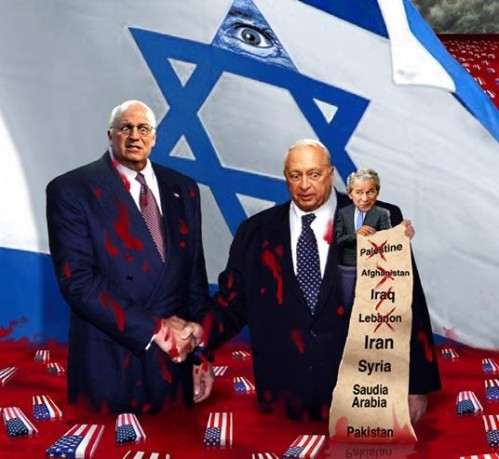
Judging by the American foreign policy, acting globally and openly in favor of Israel’s interests for 40 years (in 1973, in the Yom Kippur war, the US literally saved Israel), and by the weak European foreign policy that never counters Israel, despite giving financial support to the Palestinian Authority (245,000,000 Euros from the EU, plus 250,000,000 more in individual contributions from Union members — a support with strings attached, i.e., recognition of the state of Israel by Hamas and a pledge to ‘renounce violence’), and also without forgetting the British zionist fervor, one can conclude that the West has embraced zionism.
Is this because of interest, historic determinism (including demographic determinism), or fear ?
The European and zionist roots of the campaign of (re)populating what was to be Israel from the 1930s, the financial and human reservoir of the European diasporas from the East and the West, the support from pro-zionist Western leaders, as well as the contributions of powerful Jews (Rothschild, Bronfman) are the obvious ties of the Israeli Jews to their European roots. Nevertheless, this does not explain the decisions taken by certain Western politicians in favor of Israel, often against their own national interests. Personal determinism trumps national determinism.
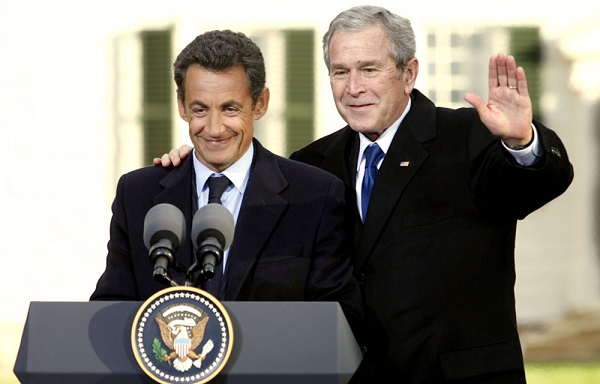
Is it interest? This posture conflicts with the need for good diplomatic relaitons with the mostly Arab oil-producing countries (buyers of Western weaponry), which are not pro-zionist, but not all anti-zionist. This explains the American double game whereby the economy has an absolute need of Arab oil, and also of the Arab market to dispose of its surplus weapons, often obsolete, while at the same time protecting Israel from international sanctions for its countless and endless territorial violations, acts of military aggression (based on its concept of “preventive strikes”) and civil and human rights violations (colonization).
Is it fear? How can this litle country, a Western outpost hunkering down in hostile territory, have the Americana and European superpowers wrapped around its little finger? Targeted killings or psychological pressure by the Mossad alone cannot exert such influence. Does the international financial power, from the “City,” and Wall Street to the financial paradises, have a homeland? What is the weight of the Rothschilds and their descendants? Where does the zionist force reside? Why have the French officials in power been kneeling before them for 30 years? Why are 95% of the media pro-zionist? Why has Hollande submitted to Netanyahu after the war on Gaza (July 2014)? Why and how did Valls, once very pro-Palestinian, convert into a fierce defender of Israel? Why can we not discuss this realpolitik with impunity?
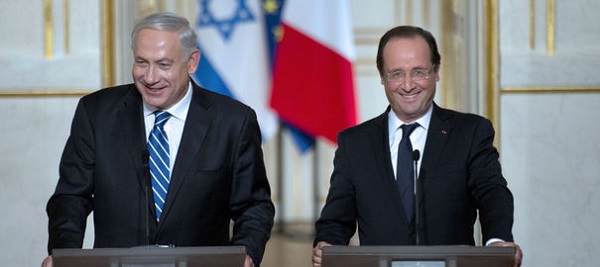
The first breakthrough, which appeared right after the open American-Soviet dichotomy of 1945 (the one in 1917 was not more than political), was the creation of the state of Israel in 1948, with the ensuing Arab wars. Not a decade has passed in the last 70 years without a war between Israel and its neighbors. Secret or open wars.
While the Israelis have been able to pacify several fronts, with Jordan after the 60s (King Hussein was close to the future leader of Mossad, Ephraim Halevy, who gave him advance warning of every attempted attack after the 1970 Black September) and Egypt in 1976, it was nevertheless primarily the Iran-Iraq conflict of 1979-1989, the double destruction of Iraq (1991 and 2003), and thus the weakening of the great nationalist spirit of its neighbors that strengthened Israel’s power.
Meanwhile Iran, after the beginning of the 90s, despite the bloodshed of the war against Iraq, a real international aggression, as expected when a country exits the American sphere, manages to finance Hezbollah, the Lebanese Shia militia, to become the first resistance army facing Israel. In the meantime Syria becomes embroiled in a civil war that hides an international aggression dictated by Israeli-American interests. Did the Americans know that the crushing of Iraq would help Iran become a new regional power despite the fact that Israel possesses nuclear arms? What purpose does the Israeli’s nuclear arsenal serve?
The Iranian President Mahmoud Ahmadinejad said to David Pujadas in an interview in Tehran partially shown in France television on March 22 2007:
« Did their bombs save them [the Americans] from the Iraq quagmire ? […] The state of Israel, which has nukes, has it won in Lebanon? »

« The Arabs are fighting better than before… They want to destroy Eretz Israel, to annihilate the Jews. »Meanwhile, where the Israelis see a possible annihilation of the state, Sadat only sees a war to recover the territories lost in 1967. This is the version presented by Skies of Glory:
« On October 13, Israel informed the Washington authorities that it had only four days’ worth of ammunition left – a statement that was in fact false, but which pushed the Americans to deliver to their ME ally significant quantities of weaponry, among which Skyhawk and Phantoms, through an enormous air bridge assured by Hercules, StarLifters and Galaxy. »Let us drop the legendary history and the Israeli tall tale that the miraculous tipping of the balance in Israel’s favor was due to the bravery of General Sharon, and examine the more prosaic history of intelligence exchange: an emissary of Golda Meir calls Henri Kissinger himself and tells him that a nuclear strike is the only solution left to the Israeli authorities to save the state from disaster. Warned, Nixon reacts by sending all the military aid possible in record time. The miraculous return of the Israeli tactical genius was in fact the entry of the US in the war in less than 48 hours on October 14, 1973.
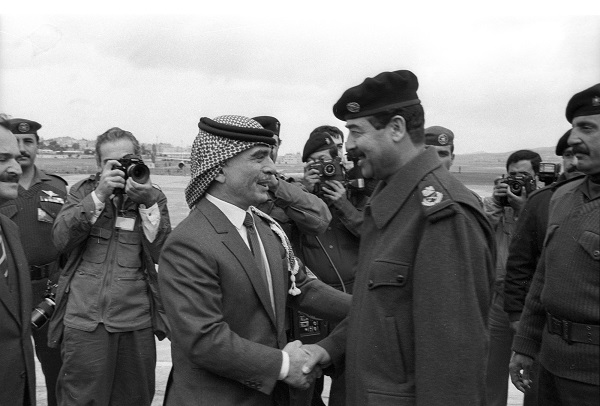
Prudent, King Hussein of Jordan always allied himself with the regional power, whether that was Iraq, as he did in 1987, or Israel. This did not prevent him from firing on Israeli aircraft flying over northern Jordan in 1973, en route to Golan, then part of Syria.
As for prudent diplomacy, we know today that right before the conflict, Hussein, as always, informed Kissinger of the imminence of an attack. At this point in time Nixon’s Secretary of State is mostly concerned with avoiding fueling the cold war with the Soviet Union, while seeking to attract Egypt away from the communist sphere of influence. He knows, because he is aware of the Israeli strategy, that this information may unleash a “deterring” attack by the Israeli aviation on the Egyptian strategic sites: ports, electric stations, bridges, air fields and refineries. He keeps quiet, thinking that like in 1967, the Arabs will lose. But in the intervening six years the Egyptians generals have learned a lot: intelligence knows how to hide its data, engineers know how to protect bridges, the infantery knows how to use anti-tank missiles. Victory is engendered by defeat.
In effect, by killing 3,000 and wounding 12,000 IDF soldiers, bringing down 114 planes and 6 helicopters, destroying 840 tanks, 400 armored vehicles and 2 patrol boats, the Arab coalition shook the Jewish state to its foundations. The American entry in the war sounded the end of the 1967 war. The publication of declassified documents (the Agranat Commission) revealed in 2005 to a terrified Israeli public that the state had been on the edge of the precipice in 1967.
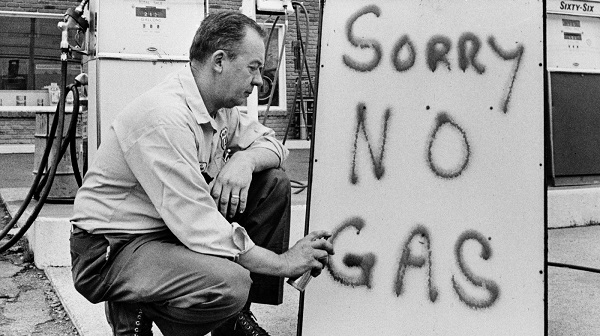
On the economic front, the response of the Arab oil-producing countries (the majority of OPEC) was prompt : from October 16, 1967 (the cease fire came on the 24), they declared an embargo on deliveries to the countries that supported the Jewish state. The price of the barrel surged by 70%, and quadrupled in five months. The economists speak of the repercussions of the end of the Vietnam war that provoked the crushing inflation starting in 1971, the crash of the stock market and the weakening of the dollar, but it is this date that actually marks the beginning of a major economic crisis in the US and Western Europe.
The Israelis managed to bypass the oil embargo by deliveries of Iranian oil (well, yes, the Iranians did trade oil with Israel by secret routes and through shell companies, notably in exchange of weapons, thanks to Arnon Milchan, Mossad’s top weapon dealer later turned … succesfull Hollywood producer!), and the 70s and 80s mark a blossoming of terrorism (aka counter-terrorism) and of the Palestinian guerilla. The public opinion witnesses a globalization of the Israelo-Palestinian conflict: hostage taking, machine gun attacks, explosions, the emergence of PFLP and other paramilitary groups issued from the Arafat nebula, which counts 60,000 men in its security forces.
The Palestinian funds, beyond the aid from rich Arab countries, cames mostly from the racket of big corporations (among which airline companies), that prefer paying protection to be sheltered from attacks. There again, it is the Western countries that pay the price of their support of the state of Israel, more exactly the support of their leaders.
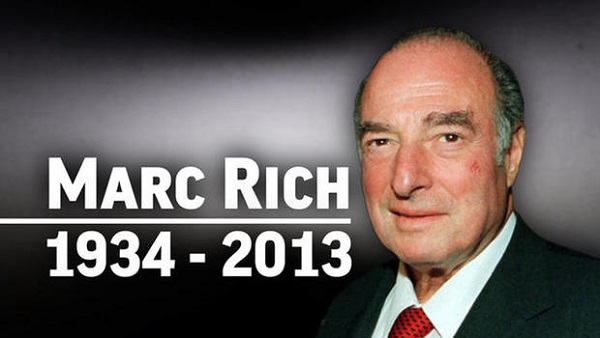
The billionaire (annual income of his company in 1980 : $15 billion) Marc Rich helped Israel to profit from the Iranian oil which he traded on international markets. His Mossad handler said: « Israel owes a great debt of gratitude to Marc. He secured the delivery of energy to Israel in the most difficult times. » (Source : The Secret Wars of Mossad, Yvonnick Denoël, Nouveau Monde editions, 2012)
On September 9, 2001, in the midst of the Israeli-Palestinian conflict (the second Intifada was triggered by Sharon on September 28, 2000), the Durban conference declares its opposition to all forms of racism. South Africa proudly announces its progress from 1978, with regard to its former apartheid regime. A week of stormy debates indicts the similarities between the Jewish state and the former South African apartheid. Worse yet: zionism is equated with racism! The simple mention of the fate of the Palestinian people provokes the fury of the Israeli delegation, which packs its bags and leaves fuming, together with the American participants. A host of African countries will not receive the apologies (and the reparations generally associated with such recognition) from the Western countries that had been involved in slavery. It is the beginning of the « double standard » in terms of the political and media treatment of the genocide of the Jews, a contrast pointed out by Dieudonné since December 2003. The demand to declare slavery a crime against humanity makes the Western delegates recoil and declare their solidarity with the Israeli position, as if the Holocaust would be diminished by the recognition of the deportation and forced labor imposed on millions of Africans. The Canadian delegate accused the conference of «delegitimizing the state of Israel and dishonoring its history and the suffering of the Jewish people».
Why does the US support Israel?
Are we living in a “clash of civilizations” as claimed in a book published in 1996 that analyzes the world after the collapse of the Soviet Union, in the sense of a New World Order so dear to the Bush dynasty?
The Bushes’ collaboration with the apartheid regime has not bolstered Israel’s popularity.

New crusades are decided upon… in the evening of September 11, 2001. The American war against nationalist Arab movements is now in the open, as is the war against Islam in general, Pakistan is taken out of the equation (pressure must be put on India, close to the Soviet Union, and not sufficiently “aligned”). The destruction of Irak very much resembled an Israeli “preventive” war against a regional power, but without Israelis.
If the numerous conflicts unleashed on the world since the 90s, after the fall of communism in the Soviet Union, are not all related to zionism, nevertheless a disproportionate number of them are directly or indirectly linked to Israel and its interests.
If we observe the influence of this small country of 8 million inhabitants on the foreign policy of the US, especially the handiwork of the Jewish Lobby, why not investigate why France follows the same path as the US, after the 2004 political breakthrough, the date when the Minister of the Interior Nicolas Sarkozy grabbed the real reins of power in France, before even being elected President of the Republic three years later.
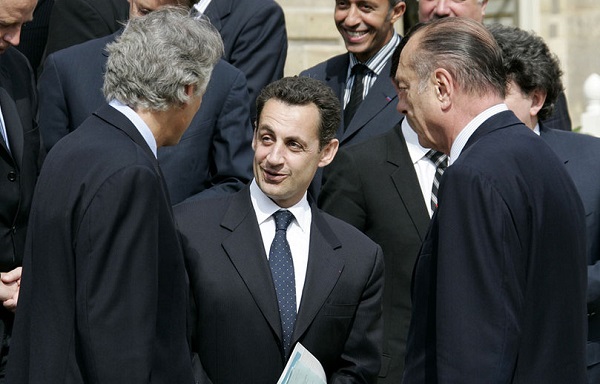
A soft change of the political hierarchy, but one with spectacular results : after having swallowed Chirac’s embrace of young Bachar al-Assad in November 1999 and the indirect support by the same Chirac of Hezbollah in August 2006, Sarkozy calls Hezbollah «a terrorist mouvement» on September 2, 2006, while stressing his permanent and indissoluble support of Israel (see Blanrue’s book on this topic), and bombs Libya in 2011. As for Hollande – although not quite taken with ultrazionism, but spurred on by Valls and CRIF – he launched air attacks against “islamists” in Mali (January 2013) and against the so-called Islamic State in Syria (September 2014).
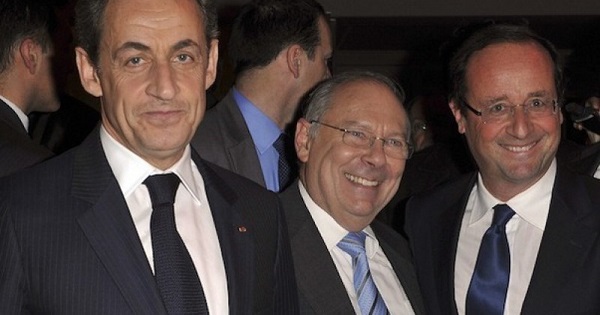
Thus we do not find any ideological rupture in the chain Sarkozy/Guéant/Kouchner-Hollande/Valls/Fabius: for the past 10 years, irrespective of its color, the foreign policy of France has been aligned with the Israelo-American positions on the ME, to the great displeasure of those who love national independence, which is obviously not a synonym of either anti-zionism nor, much less, anti-semitism.
Israel’s defense has been declared our priority by all our Prime Ministers or Presidents after their dinners with CRIF.
So, What Makes Our Leaders Cave in ?
A press campaign accusing them of anti-semitism in case of noncompliance? Revelations of a political trajectory less than straight? The threat of terrorist strikes on our land, in our skies, or against our interests abroad? Measures of grand scale financial retaliation? Do Israel and its supporters have the means?
« Without the global financial domination by the City [London’s financial center] until WWII and the creaqtion of its private currency on December 23 1913, the dollar, through the agency of its branches in the New World, zionism would have remained the heretical nationalist excrescence (localized in East Europe) of a mostly Pharisaic Judaism steeped in Talmudism. » (Interview with d’Aline de Diéguez on algeriepatriotique.com on December 6, 2012)
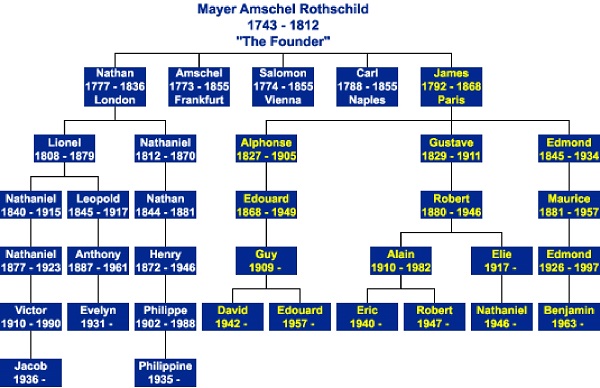
Do the media, partly subsidized by the state, held under the aegis of monsters like Publicis et Havas [Ed. Note: multinational advertising companies], and belonging to big concerns directly or indirectly linked to the war industry magnates (Dassault, Lagardère), and to banking moguls (Rothschild, Pigasse) have this power? If so, does zionism weigh so much in these areas to dictate the targets, impose priorities and shape policies?
Are the socialists in France the counterpart of the « Christian zionists » or fundamentalist Protestants on the other side of the Atlantic who, on theological or venal grounds, echo the pro-zionist position of the American government?
If nobody can seriously believe that a simple media bluff or a threat of excommunication for anti-semitism can suffice to make some of the governments of the most powerful nations on the planet cave in, then we must accept that a superior force bends the majority of the Western governments. For this, we must return to the immemorial time when Mayer Amschel entered into History …














No comments:
Post a Comment